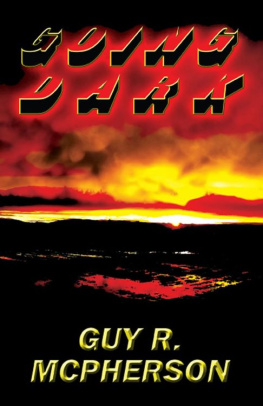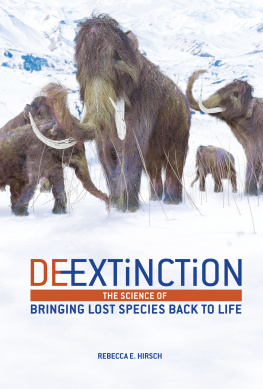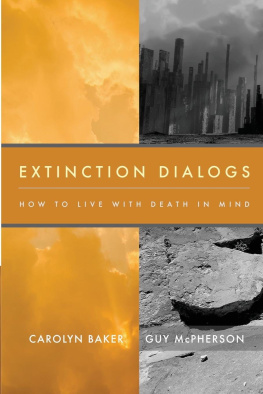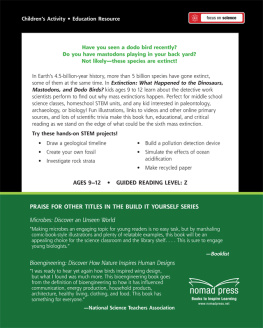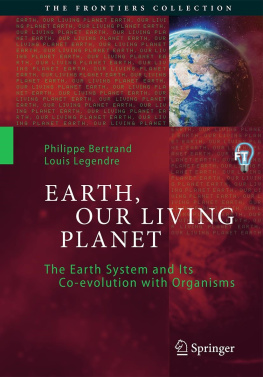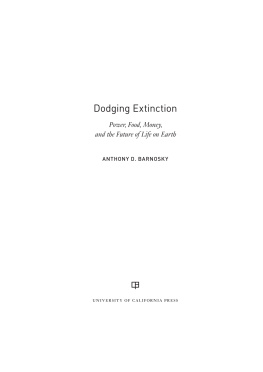Going Dark
Guy R. McPherson

PublishAmerica
Baltimore
2013 by Guy R. McPherson.
All rights reserved. No part of this book may be reproduced, stored in a retrieval system or transmitted in any form or by any means without the prior written permission of the publishers, except by a reviewer who may quote brief passages in a review to be printed in a newspaper, magazine or journal.
First printing
PublishAmerica has allowed this work to remain exactly as the author intended, verbatim, without editorial input.
Softcover 9781629074283
eBook 9781629078762
PUBLISHED BY PUBLISHAMERICA, LLLP
www.publishamerica.com
Baltimore
Printed in the United States of America
To all those who oppose the well-behaved, small-minded corporate drones who know we have no future and yet still go to their inane desk jobs, attempting to destroy the remaining shards of the living planet
"We can easily forgive a child who is afraid of the dark;
the real tragedy of life is when men are afraid of the light."
(Plato)
"Someone I loved once gave me a box full of darkness.
It took me years to understand that this too, was a gift."
(Mary Oliver)
"When you light a candle, you also cast a shadow." (Ursula
K. Le Guin)
Acknowledgments
Most of the essays in this collection were published as drafts at N ature Bats Last (guymcpherson.com). The current collection benefited from the commentary of the erudite readers at that website, as well as from the careful eyes and open minds of Judith Haran, Sheila Merrigan, John Rember, Pauline Schneider, and Mike Sliwa.
INTRODUCTION
My previous ten books have been read by few people, and have therefore had little impact. The grapevine informs me there is a good book in each of us, just waiting to get out. I'm hoping this is mine.
My other books adopted a hopelessly optimistic tone with respect to the most important phenomena in the history of our species. Until recently I believed complete collapse of the world's industrial economy would prevent runaway greenhouse and therefore allow our species to persist a few more generations. But in June 2012 the ocean of evidence on climate change overwhelmed me, and I no longer subscribe to the notion that habitat for humans will exist on Earth beyond the 2030s. We've triggered too many self-reinforcing feedback loops to prevent near-term extinction at our own hand, as I explain in later chapters.
Actually, this was a deja vu moment for me. I had reached a similar conclusion in early days of the twenty-first century while editing a book about climate change. About a year after I realized we were "done" and I began mourning the impending loss of our species, I discovered what appeared to be the ultimate hail-Mary pass: the impending peak in global oil production might cause industrial civilization to collapse in time to prevent near-term human extinction. Alas, several years after passing the peak of global oil extraction in 2005 or 2006 (according to the U.S. Energy Information Administration and International Energy Agency, respectively), the evidence is in: we're done all over again. The mourning began anew for me in June 2012.
Around this same time, I realized that my carefully thought out and constructed living arrangements no longer made any sense. My project of abandoning empire and moving off grid to a shared property in New Mexico has failed catastrophically. Consider the primary reasons I left the easy life of a tenured professor at a major university to develop and occupy the property I call the mud hut:
(1) an act of resistance against the dominant paradigm (the dominant paradigm and those within it failed to notice);
(2) an example of alternative living, in my case promoting a gift economy within agrarian anarchy (my example has failed to inspire a significant number of others to live differently);
(3) a way to provide more time for speaking and writing about important topics, actions that were discouraged at the university (I have enjoyed limited success in this arena, although time freed up not battling administrative dragons has been largely consumed with rigorous physical work);
(4) a refuge for the youngster, the son of the couple with whom my wife and I share this property, as well as his generation (due to ongoing, accelerating climate change, the youngster's future in this location probably will be notably short), and
(5) a way to extend my own life, and that of my wife (due to ongoing, accelerating climate change, our future in this location is likely to be quite short).
Perhaps most importantly, there is a widening chasm within the partnership formed on this shared property. Although leaving the life I loved as an academic to move to this location made sense at the time, long before the climate-change news grew so dire and when collapse appeared imminent, I now view the major personal transition as infinitely regrettable. I have come to see it as the worst mistake of my life, so far. I'm not dead, though, so I suspect I can yet outdo myself.
Looking back on my enormous effort and life-changing transition, it seems that perhaps our choice of homesteading partners was doomed to fail. Partnerships of all sorts fail more often than not (consider, for example, the divorce rate in the United States). The choice of partners for constructing a viable off-grid homestead is perhaps even more crucial than the choice of one's spouse.
My attempt to walk away from empire has failed in part because empire is stunningly difficult to leave behind. The disaster of American imperialism follows like the "evil twin" of a beloved dog: You know something is dogging your heels, but it's no longer your loving companion. I'm left with the horrors of American Empire and the abyss of near-term human extinction without my long-time canine friend.
The sun sets
One day short of a full year after I re-reached the conclusion about near-term human extinction, darkness fell again. My canine companion of nearly 16 years, Savanna Louise Rose O'Malley McPherson, died on 19 June 2013 while my wife and I were in an airplane en route to a family wedding. Her most recent photo, taken just hours before leaving on our trip, smiled back at me on my computer. Overwhelmed, I dove deeply into despair yet again.
Way back when, my family had a dog as I was growing up. Shorty arrived when I was in elementary school. A short, homely terrier of dubious heritage, she was an excellent, adventurous traveler. She loved camping and was truly an integral part of the family until she died during my college years.
My wife and I held out for a long time before we felt sufficiently mature and financially stable to have a pet of our own. Shortly after we moved into our first non-rental homeand so far, only one of two we've ownedwe adopted a recently weaned puppy from the Humane Society in Tucson. Ever the rationalist, I insisted upon several criteria before we viewed the available dogs: female, puppy, short hair, light color, about 50 pounds fully grown.
When my wife walked into the room with available dogs, she settled on the first animal that entered her view. I consider myself lucky she didn't first see a hippopotamus, although we did adopt a black, Doberman-German Shepherd mix that achieved nearly 100 pounds in weight.
Mancha (Spanish for "Spot") quickly became our constant companion. She walked us twice daily in the Sonoran Desert near our small, suburban home. She took us hiking and camping and, like my childhood dog, became very much a part of me.
Mancha was diagnosed with bone cancer at about a year of age, and she died shortly after her second birthday. We approved chemotherapy and radiation therapy, and we held on too long. When Mancha died, she nearly took me with her: If I'd have had a handgun at my disposal, I would've used it on myself. The grief was horrible, and thinking about Mancha still brings tears to my eyes today, more than twenty years after her death.
Next page
